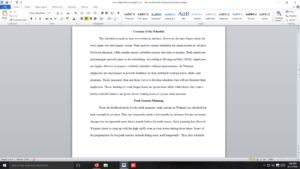Interview with a retail manger
Manager is a management, isn’t it? Describe the similarities and unique differences between being a manager in general and being a retail manager. As a part of this, conduct a phone or video interview with a retail manger and find out some of the following:
- Who is responsible for employee scheduling?
- How far in advance is the schedule made?
- How are peak periods (hours, days, or seasons) planned for?
- What happens when an employee calls in sick at the last minute?
- How are associates trained? What are the criteria for evaluation?
- How often are they evaluated?
- If there is no commission system, are any incentive programs offered? Give an example of a specific program or project used by the store to boost employee morale and productivity.
- What are the procedures for approaching a suspected shoplifters?
- What roles do sales associates and executives play in the security programs?
- What is this retailer doing well in terms of security and loss prevention, and in which areas should it improve its policies?
Write at least a 1500 word document that presents your findings.
Your research must also include at least 3 additional academic (e.g., journal articles) resources in addition to your textbook to support your conclusions.
Format your paper consistent with APA guidelines:
Title Page
Introduction and Conclusion
Main Headings for each section of the Minor Project
APA Citations: (all direct quotes must include the page or paragraph numbers)
References
- Retailing Management, (Boston, MA: McGraw-Hill Irwin, 9th edition, 2014), Michael Levy and Barton Weitz, ISBN: 9780077512378
- APA 6th Edition Publication Manual of the American Psychological Association, (2009), American Psychological Association, ISBN 978-1-4338-0561-5. Available through http://www.apa.org/pubs/books/
4200066.aspx
Answer preview
The schedule is made at least two weeks in advance. However, the time frame varies for every peak, low and regular season. Peak and low season schedules are made months in advance for better planning, while regular-season schedules require less time to prepare. Both employees and managers provide input in the scheduling. According to Hwang and Park (2016), employees are legally allowed to propose workable schedules without repercussions. At Walmart, employees are encouraged to provide feedback on their preferred working hours, shifts, and programs. Retail managers then use these views to develop schedules that will not frustrate their employees. Those desiring to work longer hours are given more shifts while those who want a better work-life balance are given fewer working hours to pursue other interests.
[1597 Words]
Interview with a retail manger


